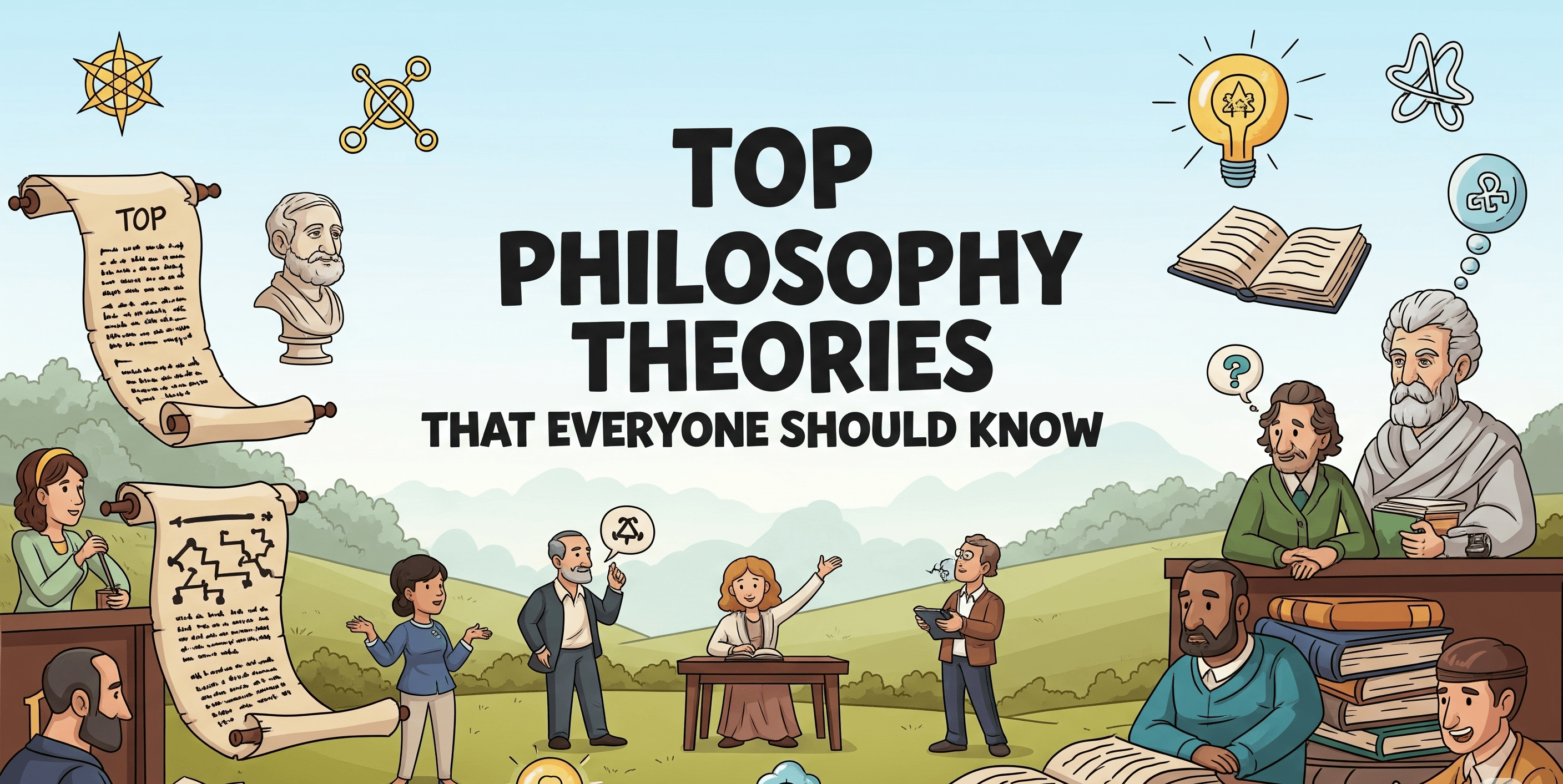Philosophy is more than old books and fancy words—it is where we base our thinking, reasoning, and questioning of our surroundings. Over the years, philosophy has developed several powerful philosophies that have informed cultures, political systems, educational systems, personal values and countless other ideas. The views of philosophy listed below have provided frameworks for understanding everything, from existence, ethics, truth, and happiness.
Whether you are a student looking to explore some of the deeper ideas in your readings or someone with just a point of curiosity about some of the great thinkers, these suggested must-know philosophies will provide you with a solid foundation. We have reduced these big thinking ideas into palatable morsels of knowledge that will assist in opening and distorting your mind towards diverse philosophical insights. You will not only comprehend these ideas, but you will also begin to think of them more appreciably, in addition to recognizing how they still impact our lives today. Let us now take a look at the top types of philosophy that everyone should know!
1. Socratic Method – Question Everything
Although Socrates did not leave behind any written works, the way he engaged people with deep questions laid the groundwork for all philosophical theories. He practiced dialogue, which included having a conversation that could include asking and answering questions to provoke inquiry into subjects of interest. This method of communication is to remind us never to take anything on face value, always examine the various possibilities. The Socratic method is still utilized in today’s education, movement therapy and even in law.
2. Plato's Theory of Forms
In Plato's case, he was the student of Socrates, but he believed that the physical world we see is a shadow of a greater reality. Plato believed that the real truth comes from the ideas or "Forms" of beauty, justice, love, etc. Since Forms are not intertwined with time, they are therefore unchanging and are ultimately more real and lasting than our perception of these ideas through our senses. Plato's field of Philosophy continues to influence us in our modern world, even influencing today's Science and Politics.
3. Virtue Ethics – Aristotle
Aristotle did not focus on the good action a person must perform, but ultimately instructed us that the goal must become a good person by thinking and developing through moral character, not just practicing moral acts. Aristotle contended that if we took the time to learn and work on character and build virtues like courage or honesty, the end of the journey is more enjoyable and fulfilling. Aristotelian virtue theory, by a prolific body of philosophers, laid the foundation for virtue-based ethical thinking in both Eastern and Western dialects.
4. Rationalism - Trust in Reason
Plato and Aristotle believed that reason stems from our innate thinking and that it is the primary route to knowledge. If this theory is taken to an extreme, then it suggests that logic and reasoning from thought are more reliable than the observations made through the senses, including your own. Rationalism is responsible for a lot of the science we know today and is a rational way to explain some aspects of how we learn. Rationalism is a strong contender on the list of philosophical types that challenge your knowledge.
5. Empiricism Learning through Experience
In contrast, philosophical positions such as Empiricism, believed by Locke and Hume, believe that knowledge comes from experience. In this view, all knowledge begins with the senses. The rational view helped develop the scientific process, which, in turn, is an important part of modern education. It is one of the least abstract philosophical types.
6. Existentialism You Determine Meaning
Existentialism is a philosophical view. Popularized by philosophers like Sartre and Camus, Existentialist philosophy believes there is no universal or preset meaning to life—meaning is determined by you. This works with youth today who are living in a world that often feels meaningless and uncertain. Working with this perspective of philosophical thinking can better enable you to live with more awareness and deeper authenticity.
Learn more about other expressions of purpose and meaning with professional support through Counselling.
7. Utilitarianism – Maximize Happiness for the Most Amount of People
Utilitarianism follows the belief that the "best" action is the one that maximizes happiness for the greatest number of people. Thinkers such as Bentham and Mill expanded upon this concept to help develop a fairer society. It is one of the most commonly leveraged philosophical theories in public policy, economics, and law.
8. Nihilism – Nothing Matters
This one has a dark ring, but Nihilism weighs in the opposition to all traditional philosophies. Life and existence are not connected to any real meaning or value. While this can be disheartening, nihilism shows people that they don't have to define their purpose; their purpose leads to evaluations of outside systems.
Learn how career coaching and guidance can be a source of direction in your journey with one of our counsellors.
9. Confucianism – Values and Relationships above Everything
Uniquely in this list of philosophies, Confucianism is based within Chinese tradition, but highlights human values that come from respect, family, legitimacy and social harmony. In some ways, it takes a different approach to philosophy, focusing more on relationships than individualism. These values are still reflected in both culture and education systems in Asian cultures and beyond.
Not sure what your next steps academically look like? Try an online psychometric test to gain insight.
10. Stoicism - Control What You Can
This ancient Greek theory teaches us to accept what we cannot change, and to develop self-control and virtue. Stoicism has become very popular again today, especially as people navigate anxiety and stress. Stoicism is probably one of the most practical theories in mental wellness.
If you're interested in learning about philosophical training/programs around the world, check out this post on study abroad certification programs.
Frequently Asked Questions
Q1. Why should I learn philosophical theories?
Learning philosophical theories benefits us by helping us understand who we are, what we are doing, and what our society looks like. These ideas can unlock new ways of thinking and promote a richer understanding of existence.
Q2. What do these philosophies bring to today's life?
Philosophies influence education, politics, science, and self-improvement. From the way a teacher explains a lesson to judges ruling in court, philosophies continually influence choices made by people, organizations, and communities, shaping our values and outlook.
Q3. Are all philosophy theories useful for life?
Not every philosophy is useful, but just about all philosophical theories have some form of utility. Stoicism is good for dealing with stress, while Utilitarianism can assist in social planning.
Q4. Can teenagers or students understand philosophies?
Sure. Many philosophical views can be less complex than they might seem, provided they are explained simply enough. Philosophies like "indirect representation" can also aid students in more robust critical thinking and reasoning.
Q5. Where can I find more information about careers in philosophy or related professions?
You can search articles, take online tests, and talk to mentors. You may also get ideas from the following article about job openings in railways after the 12th class - it demonstrates career diversity, even if you do not know where to start











